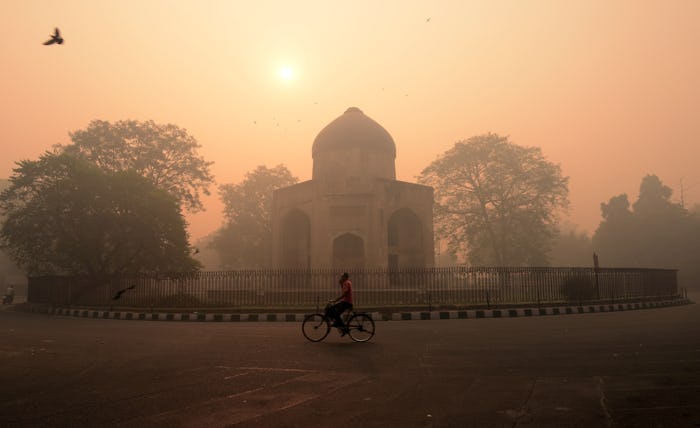Life

UNICEF Says Air Pollution Is Killing 600,000 Kids A Year, & Here's What You Need To Know
UNICEF is asking world leaders to do more to cut back the amount of air pollution their nations' children are being exposed to. The organization just released a shocking report that found air pollution is killing more than 600,000 kids a year across the world, and that more than 300 million children worldwide are living, and breathing, in areas with toxic levels of air pollution.
The UNICEF report said that air quality for children is a huge problem. The new report, by Clear The Air for Children, found that nearly 1 out of every 10 deaths of children under 5 years old is linked to air pollution. That includes both outdoor and indoor air pollution that cause pneumonia and other deadly respiratory illnesses, UNICEF's report said.
UNICEF also found that levels of outdoor air pollution from fossil fuels, manufacturing, smoke, and vehicle exhaust jumped by 8 percent between 2008 and 2013, and that if steps aren't taken in urban areas to improve air quality, outdoor air pollution will become the single biggest cause of child deaths related to the environment by 2050. China and India are two countries with the worst air quality in their urban centers, according to UNICEF, which found the single most polluted city in the world is Onitsha, Nigeria.
Indoor air pollution, on the other hand, tends to effect children in rural areas. Most indoor pollutants, according to UNICEF come from burning stoves used for cooking, but can also include fuels burned for lighting, and even mold, dust mites, and bacteria. The report also found indoor air pollution actually kills more children across the world than outdoor air pollution. Africa and Asia are where the majority of households burn solid fuels for cooking, putting the children in these areas at a greater risk of death from poor air quality.
The study's author, Nicholas Rees, explained to the Washington Post why children are more susceptible to air pollution than adults. They have weaker immune systems, developing brains, and children breathe about twice as quickly, allowing them to suck in more pollutants relative to their body weight than grown ups. Rees told the Post:
That physiological difference essentially makes them even more vulnerable. It’s also that the poorest children are the most affected. If we look at the burden of mortality associated with air pollution, we find that the vast majority — about 90 percent of outdoor air pollution deaths — are in low- and middle-income countries.
So what can we do? George D. Thurston, an environmental medicine professor at New York University, said the best way forward to tackle the problem of air pollution is a commitment to alternative, cleaner energy sources, according to the Washington Post.
"The things you have to do to prevent climate change are also good for public health," Thurston said, according to the Post. “You’re going to save lives, and by the way, you’re also going to save the planet."
UNICEF released this report in advance of COP 22, a meeting of world leaders in Marrakesh, Morocco, next week where the organization will call on the entire world to do more to boost air quality for children. UNICEF is asking leaders across the world to: reduce pollution, provide better access to healthcare for kids, reduce children's exposure to air pollution, and maintain a vigilant watch over air quality numbers in their areas.
"The magnitude of the danger air pollution poses is enormous,” Anthony Lake, Unicef’s executive director said, according to The Guardian. “No society can afford to ignore air pollution. We protect our children when we protect the quality of our air. Both are central to our future.”